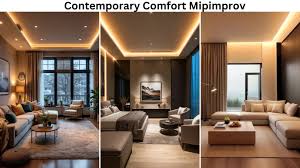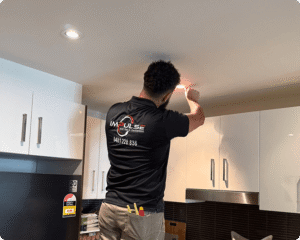Embracing Contemporary Comfort with Mipimprov: A New Era of Home Styling

contemporary comfort mipimprov
Introduction to Contemporary Comfort Mipimprov
Home decoration has evolved from elaborate designs to more thoughtful and simplified aesthetics. In this journey, a new concept has started gaining traction—contemporary comfort mipimprov. This phrase blends modern living ideas with a unique twist: optimizing space, functionality, and emotional wellness within a visually clean and harmonious environment.
So, what exactly is “mipimprov”? While not found in conventional design dictionaries, this emerging style term represents “Minimalist Inspired Personal Improvement”. It’s a home styling technique that encourages creating spaces that feel cozy, calm, and reflective of personal growth—all wrapped in a sleek, contemporary shell.
The Core of Mipimprov: Where Minimalism Meets Warmth
Unlike traditional minimalism, which often leans cold and overly neutral, mipimprov adds layers of warmth, depth, and personal energy. Think of it as minimalism with a soul. The key is to retain open space and simplicity while adding subtle comfort features that reflect your life journey.
Key Elements of Mipimprov Design:
- Natural Textures: Wood, linen, bamboo, soft cotton
- Soft Neutrals: Off-white, beige, muted greens, and warm grays
- Intentional Furniture: Fewer but more meaningful pieces
- Calming Light: Indirect lighting, warm LEDs, and natural sunlight
- Reflective Corners: Spaces for mindfulness, reading, or journaling
Designing a Living Room with Mipimprov in Mind
The living room is often the first area where people experiment with new design concepts. When adopting contemporary comfort mipimprov, the goal should be to create an inviting yet uncluttered space.
Start with the Layout
Keep things open. Avoid overloading the room with furniture. Instead of a bulky sofa, you might opt for a low-profile couch with soft cushions, paired with a modest coffee table made from recycled wood or matte steel.
Introduce Soft Touches
Even a single woven rug or a textured throw can bring mipimprov to life. Avoid patterns that are too loud or contrasting. Subtlety is everything.
The Power of One Accent Piece
Rather than over-decorating, choose one meaningful centerpiece—a handcrafted sculpture, a wall-mounted wood panel, or a unique ceramic lamp.
Bedroom Transformation: Quiet Luxury Meets Personal Peace
The bedroom is where comfort truly matters. With mipimprov, you’re not chasing luxury through cost, but through calmness and authenticity.
Keep the Color Palette Muted
Avoid bright reds, bold blues, or anything too stimulating. Instead, use shades that invite rest—sand, foggy gray, almond white.
Opt for Layered Bedding
Use layered fabrics like linen sheets, cotton blankets, and a textured comforter in a neutral tone. Each layer adds depth without visual noise.
Personal Corners
Reserve one side for a small self-growth area. This could include a soft floor cushion, a low table with your journal, or a simple plant for oxygenation and aesthetics.
Kitchen and Dining: Function Meets Calm
In mipimprov, even functional spaces like the kitchen follow the same visual and emotional logic. Sleek, clean, but not sterile.
Open Storage and Quiet Design
Use open shelves to keep only what’s needed. A set of ceramic plates, wooden spoons, and clay mugs not only serve practical needs but also act as design elements.
Simple Dining Setup
Forget the over-sized dining tables. A modest, smooth-surfaced wooden table with two or four chairs is often enough. Light above should be soft, not too direct.
Bathroom Spaces with Serenity Built-In
The bathroom might be small, but in a mipimprov-styled home, it holds big emotional value. It’s the space where routine and reflection come together.
Natural Materials and Light
Incorporate stone basins, matte faucets, and bamboo racks. Avoid flashy tiles—go for texture-rich walls in calming tones.
Scent and Silence
Use natural oils like lavender or sandalwood. Keep noise to a minimum by using soft-close drawers and sound-absorbing rugs.
How Mipimprov Enhances Daily Living
While this might seem like just another decor style, mipimprov is rooted in behavioral psychology. It encourages slow living, mindful choices, and environmental awareness.
Mental Clarity
Removing clutter and visual distractions supports clearer thought and reduced stress. A space that doesn’t compete for your attention gives your mind room to breathe.
Emotional Uplift
Soft textures, warm lights, and personal elements foster positive emotions. You feel more grounded and supported.
Self-Reflection
Dedicated corners for reading or thinking—no matter how small—can turn into powerful tools for self-improvement.
Common Mistakes to Avoid in Mipimprov Interiors
Even though the style appears simple, some missteps can break its harmony.
1. Overdoing Neutrals
Too much beige or gray without texture can feel bland. Use plants or small wooden accents to add visual interest.
2. Using Trendy Items Without Meaning
Everything in a mipimprov space should serve a functional or emotional purpose. Don’t add decor just because it’s in fashion.
3. Forgetting the Lighting
This style depends heavily on how light interacts with space. Avoid cold, white LED bulbs. Go for warm-tone lighting to enhance comfort.
How to Begin Your Own Mipimprov Makeover
You don’t need a large budget or major renovations to start. Begin small and be intentional.
- Step 1: Pick one room to start with—preferably your living room or bedroom.
- Step 2: Remove unnecessary items. Keep only what is useful or meaningful.
- Step 3: Add one or two natural texture elements—a rug, a woven basket, or a piece of unfinished wood.
- Step 4: Adjust lighting—switch bulbs, open curtains, or reposition lamps.
- Step 5: Create a small personal zone for reflection or comfort.
Mipimprov is More Than a Trend
The beauty of contemporary comfort mipimprov lies in its ability to balance modern aesthetics with mindful living. It’s not just about furniture or color choices—it’s about creating an environment that reflects who you are and how you wish to grow.
If you’re looking to refresh your home while also refreshing your mind, this might be the design path for you. Start slow, stay authentic, and let each object in your space tell a small story of comfort and simplicity.





